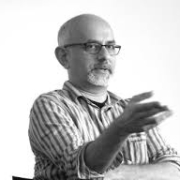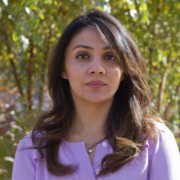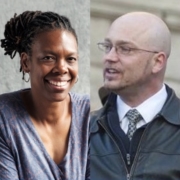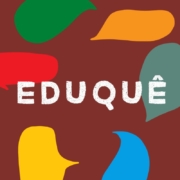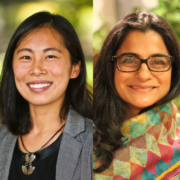Gina Athena Ulysse
Haiti, me & THE WORLD
My guest today is Gina Athena Ulysse, a professor of Anthropology at Wesleyan University in Connecticut. She has a new book entitled Because when God is too busy: Haiti, me & THE WOLRD.
Gina’s is a feminist artist-anthropologist-activist and self-described Post-Zora Interventionist. Her creative projects lie within the intersections of geopolitics, historical representations, and the dailiness of Black diasporic conditions. Her latest work, “Remixed Ode to Rebel’s Spirit,” involves conversations with ghosts roving the British Museum.
Citation: Ulysse, Gina Athena, interview with Will Brehm, FreshEd, 110, podcast audio, April 2, 2018. https://freshedpodcast.com/ulysse/
Will Brehm 1:27
Gina Athena Ulysee, welcome to FreshEd.
Gina Athena Ulysse 1:31
Thank you.
Will Brehm 1:31
You have long called for new narratives on Haiti. Could you tell me a little bit about some of these old narratives that you think need to be changed?
Gina Athena Ulysse 1:42
Well, I think those old narratives are everywhere. They are especially in the public sphere, and what we see in the media. They are part of policy. They are basically the way that in popular imagination, people tend to think of Haiti, right. So, this poet, Jean-Claude Martineau, know, had said, Haiti has a famous last name, quote, unquote, the poorest nation in the Western Hemisphere, right? It says nothing about the amount of wealth that’s in the country. Because what’s interesting is to have the extremity of the poverty, you also have extreme wealth, but we never hear about that part. So, this idea of new narratives really came from a disgust -because I’ve been living with it for quite a long time and have studied it as well- of seeing these very simple ideas being the sole way that Haiti is talked about. Although, I think, in the last couple of years, things are changing and a lot of it has to do with social media and the fact that once these stereotypes are out there, there are people from all walks of life with access, who can point to how those perceptions are limited, are archaic, and are damaging. So, I think the thing about these old narratives really, we’re more familiar with them than we are with new, and I tend to be a bit cautious about not giving them more airtime. They’ve had airtime for over several hundreds of years, right. So that to think of Haiti, you know, sort of like this Magic Island, “Voodoo”, when the reality of it is that in Haiti, especially of late, you know, there are as many Protestants as there are Catholics, and a number of folks have been converting for a very long time because of the role that missionaries continue to play in the country, especially as non-governmental organizations that are a parallel state system, right? So, there’s so much going on in terms of, it is something that’s taken for granted, you know, this idea of a sort of very poor country, and we know less about how it got that way, that it is that way, and as a result, Haitian themselves are reducible to their conditions.
Will Brehm 4:40
And so, let’s not focus too much on these old narratives. I mean let’s go to some of these new, or potentially, new narratives. And I guess, reading your new book, it’s really quite a journey to go through between all of the poetry, the self-reflection, the sort of political narratives, but also all of these images that are sort of interspersed throughout. Is this your attempt at sort of constructing a new narrative?
Gina Athena Ulysse 5:09
Actually, no. I certainly didn’t think of it that way. I call this book my post-mortem. It’s like a forensic analysis, right. It’s a project whereby after spending years, and years, and years, and years, thinking through certain things and issues, and having written some of these pieces. There are pieces in there that I wrote when I was very, very young to things that I wrote just a year before the book was put together. So, it really is this project in which I meditated, right, to some degree on these narratives, and painstakingly and lyrically, and unapologetically point how these images have come to being and then presenting my own images without commentary, right? Because that was really important to me, that the photographs in there not have titles, not be explained, so that images could stand on their own foreshadowing, or even shadowing, right, those narratives. Because where do we go by default when we’re thinking of certain things, the way we make order of things in the world. We go to default zone. So, to go to default zone, looking at some of these photographs, while, if you’re reading what I’ve said, will certainly make you think critically about things. And I think the whole point is lyrical meditation, that is meant, was meant, to inspire deeper thinking and feeling.
Will Brehm 6:58
I was very fascinated with the sort of critique on anthropology. I mean, you are a professor of anthropology. But it seems like your book was also very critical of the field of anthropology itself.
Gina Athena Ulysse 7:13
Yes, absolutely. As we should always be critical of things that we love. This is my James Baldwin moment, you know. I love this country. And it is precisely because I love it that I criticize it so searingly and we should. Because we shouldn’t accept it as it is. I mean, I think the thing that’s clear for me, in terms of this critique of anthropology is because I know the history of anthropology. I know that this is a discipline that was more or less created to make sense out of scientific racism, and to exploit the labor of some folks who were deemed to be inferior precisely because that perception of them as inferior would allow to subjugate them. And it’s the same thing with empire building. So, you know, anthropology to me as a discipline has a history that it has to reckon with. I chose it in part because it was also the discipline that gave me a sense of what Michel-Rolph Trouillot calls the “moral optimism,” a way of thinking about the world. Because if you do that work, you will get to understand that ultimately, we’re all complex beings who are affected by social, economic, and geopolitical forces, and what we know, who we are, is learned. So, that’s like a beautiful thing to me, you know. There’s a whole range of what it means to be able to conduct research, and then being able to sort of present it to people in so many different ways. So, anthropology made me love research. Also didn’t like it as much because it has some tough parts when in terms of doing fieldwork, but it made me appreciate knowledge, made me appreciate difference, made me understand things as social, right, and not just personal, right, and as structural. So, of course, I’m critical of it. And I’m critical of it right in the middle of it, right. So, I think the thing is what it means to have that lens, that sort of searing critique now at my age and what it meant when I was a graduate student when I felt like it was literally killing me. And I think that’s what comes through in the book, right? It’s sort of this idea of anthropology incubating racism, which is a line in one of the poems which I really like. And it did. You know, if you look into the history of the discipline, its emergence, and its role over the years, that is what you find. But then at the same time, there’s been some pushback, right? There were people in the discipline who understood, who saw the limits of the discipline, who tried and did work to expand it. So that this idea of quote, unquote, “otherness” that we are too intimate with, has been challenged and sort of paved the way for people like me and people who came before me to do the kind of work that allows us to see our shared humanity -those of us who are capable of seeing that because not all of us are.
Will Brehm 10:44
So, you have this beautiful line in the book as well, you say, why do you think so many Black women in anthropology turn towards the arts? And so, it made me think, turning towards the art, is this a way to overcome not only the racism in the field of anthropology, but also, as you said, the sort of focus on science -the scientification of this very social field. I mean, are arts sort of this way to get over that?
Gina Athena Ulysse 11:14
Well, it’s not getting over it. It’s really about thinking through what it means to see this intend them, right. Because there’s a whole gendered, and there’s a class and race aspect to thinking about knowledge. And there’s a way it’s feminized, it’s artistic, right? And if it’s scientific, then it’s more, you know, masculine, it’s more rigorous, it’s more objective and so forth. And we know that objectivity is hogwash, we do know that. One’s position influences how it is that they see things and what they do about these things. So, the thing about that comment, really, it was an homage -I mean because it’s from that poem, “homage to those who hollered before me”- of Black women like Zora Neale Hurston, like Katherine Dunham, Irene Diggs and others Faye V. Harrison, Ruth, Behar, women who had an artistic impulse, right, who were pursuing anthropology and the further back you go, the tendency wanted was, they chose the arts, especially back then, when it was even more difficult for Black women to be in the academy and thrive, right. So, this idea that to be Black one couldn’t be one. Well, first of all, you’re a native anthropologist, right? And meaning always a subject, right? This is part of the questioning there too. What happens when you’ve always been a subject of a discipline, right? Like you’re the ones that gets to be studied. So, what are you doing here studying, right? You know, what does the native quote unquote, and I put that in big, big quotes, have to offer a discipline that’s sort of premised upon this idea of otherness and which is something that the world is highly economically and socially invested in? So, the thing with the arts to me was always about not having to choose head over heart, right? It’s like that visceral versus the cerebral. I mean, I’m not a split person. I’ve been made to be split, when you go through graduate school experience trying to get a PhD. The whole point is, you know, you’re going to eventually become a white dude. I mean because that was what it was like back then. Because that’s part of what the aspiration is, right? You’re going to wear tweed someday, I’m just kind of making a joke but the reality of it is that not all of us operate that way, right? And so, then the expectation is that feelings will be put aside because you’re going to be this sort of objective, scholar type person. And that the feeling is where the arts tend to go, right. So, there’s, I think Lani Guinier was the person whose memoir, she came to Michigan when I was there and gave a talk about Becoming a Gentleman is the title of her book about having gone to law school, right. Because the whole process was to sort of socialize you into a particular kind of being, and it’s not any different with anthropology. So, the thing for me is, I was always an artist. I went into grad school, abandoning, if you will, dreams of being a singer and being a rock star, right. Like, I mean, I had all these happy, like MTV generation type. Whoo! And then I make a joke and I did the next best thing; I became an academic. And then now all I am is an artist. And I was able to sort of let myself try to do that for as long as I could. And we’ve reached our saturation point. I’m full-on artist right now. I’ve been reemerging since I’ve been here working, and the arts is where -my spirit is at most peace there.
Will Brehm 15:29
Would you consider yourself an anthropologist?
Gina Athena Ulysse 15:31
Of course, that’s not a question. That’s not even a question. What are you saying, Will?
Will Brehm 15:37
I’m sorry, I’m sorry.
Gina Athena Ulysse 15:39
Because if we take that as the question, then we go back to the split of the cerebral and the visceral, right. And I don’t buy into that. I understand only too well the function of disciplines and their genderization as a tool of academic institutions. I know what it does, I understand why they exist. But I like to say no subject lives their lives along disciplinary lines, you know, so when I come into a room, when I’m taking a breath right now, I’m not saying I’m having an anthropological breath. This is the artistic breath, right? Nobody’s lived that way, any more than I’m having a biological experience while we’re talking. And I’m one way having an economic one while we’re talking. That’s not true. That’s not what those things are functioning to do. They’re meant to map out a way of thinking how ideas I’ve developed over time. It doesn’t map onto the subject, a human subject, a plant subject quite in the same way. That’s a function of the academy. And I think it’s important that I be really clear about that. So, I now say, I’m an artist-anthropologist-activist, right. And I put the artist first because it really is where I’ve always resided. And I’m done pretending that’s not where I am anymore.
Will Brehm 17:07
It’s interesting. I mean, there seems to be certain parallels to these old narratives on Haiti that you earlier described, that were so focused on, I guess, economic issues of poverty, right? That they didn’t see the wealth, they didn’t see all these other things that Haiti was, and they just focused in and sort of segmented out this one particular issue of the economic limitation, I guess, in the capitalist system, not so much money. And that was the only way it was sort of seen.
Gina Athena Ulysse 17:41
Well, I mean, I think it’s a bit more complex than just economic limitation because so much of it is about Blackness, right? And the way to think it through is, you know, if we start thinking about development narratives, for example, right? Haiti needs to be developed, because it’s poor, but no one talks about the fact that how we got that poor. Nor do we talk about the fact that, you know, 200 and so years ago, it was “The Pearl of the Antilles” because it was France’s most profitable colony. So, the thing about the connection between race and economic ideas, right, and self-determination and self-making, these are all intertwined, and, as most people who are Haiti-philes will tell you, it goes back to the Haitian Revolution, and I’ve written about this as well, whereby this small little country in the Caribbean actually revolted against the European super powers of the time, and managed to defeat the French, the British, and the Spanish and declared Haiti, a free Black republic, where slavery was abolished, right. So, I think the thing about that for me, we can’t talk about the way Haiti is understood in popular imagination and portrayed without going back to that moment, not so much to romanticize it, but to point out the significance of it not just as an historical moment, but as a moment of intervention in terms of our understanding the rights of man, you know what I mean? So, it’s like, in terms of any attempt to try to understand the concept of man as free from a European standpoints that completely bypasses the Haitian Revolution and its significance is ignoring the fact that the French Revolution and the American Revolution both kept slavery intact. It was the Haitian Revolution that actually abolished slavery and declared all men, women, all beings free. So, the significance of that. And for me, it’s been kind of wonderful to see, especially in this past year, two years, how people are quick on social media, right, like ‘wait you don’t know about the Haitian Revolution?’ And it’s important that that needs to be as well-known as the French, as the American Revolution because it is of that level of significance.
Will Brehm 20:34
I actually want to go back into this issue of social media. I mean, that’s very interesting. So, you’re saying that on social media, there’s this space available for people to really discuss the Haitian Revolution, which is not being discussed in perhaps certain school curricula, for instance? So, can you tell me more about this? Like how is this happening? What does it look like?
Gina Athena Ulysse 20:56
Well, no, it’s less that it’s a space for discussion, what it is -you know, when things do come up in the media, and they do, right, in mainstream media, that just reinforces the older narratives there are more people with knowledge, who now have access to some platforms who will pipe in and say, you’re missing the historical component here. You see what I’m saying? So, in a good example, is 45’s -I do not say the name- comment about “shithole”. People were like on top of it right away, they were just like, oh no, no, no, right. And it doesn’t mean that those comments don’t have grounding, they don’t reinforce ideas, but the quickness to have a response that tries to set the record clearer, and point to our tendency to live with and be in a state of historical amnesia is really important, right? Especially since, as you noted, school curricula tend to not have these things, right. So, it’s like, these are opportunities that I think social media allows. And I think we’re also living in times that are dangerously frightening, for lots of reasons, including a return back to a silencing of difference. That’s something that we all have to fight against. And as you know, I talk about silence all the time, having sort of grown up under a dictatorship, you know, and I said, I have a very difficult relationship with silence. Because I grew up being socialized to understand silence as a commodity. Now, I did not have that language as a young, young person, but now that is exactly what it is. It is something that you trade for safety. It is something that you trade as you live with horror. So, you know, but I also grew up understanding it is something that you fight against accepting, right? So, the significance of what it means when your voice right, you know, I often say that silence is just another structure of power that I refuse to recreate, because that’s what it is. It’s a structure of power. And we can decide whether or not we will abide by it and what those terms are, and they’re going to be different for anyone. But when we’re living in times, where what it means to speak out is significant, one does not bypass that.
Will Brehm 24:01
So, how would you describe the structure of power of silence in today’s world?
Gina Athena Ulysse 24:07
Well, I mean, I think you know, there are ways that it’s brutal. I think because people police each other. People are less kind to one another. I mean, this whole Facebook thing that’s happening. I find it very -I mean, I saw people get radicalized and then, but you know what I said: that beast was in there. It wasn’t implanted by Facebook. It woke it up! It woke it up! Like that tendency to be insular, that tendency to be fearful, that tendency to not be curious about other people. That’s what I’m calling the beast, right? Like those sort of like small mindedness was there and it got stoked, right. That’s the silencing, in a sense, because people in some ways have become so self-absorbed that we don’t see someone else. And I’m being kind because I’m not really that person. Or, you know that it’s okay to become so inhumane. I’m frightened, honestly, genuinely, an adult frightened by a lack of humanity, on our part, that’s a form of silencing. To become so comfortable, or be able to turn away from horror, and it’s horror that’s been going on for a very long time. It’s not just now, it’s not just since 2016. It is that we live in a world where we’re so individually minded, or we only think about our families, and I’m a completely different kind of person. And I’ve been struggling with how to sort of manage the fact that I feel like a fractal, right? I said, there’s something personal about fractals. I’m in the world and of the world. So, when you say, how are you doing? How are things going? These days, I’m always like, all things considered, because I may be fine, my family may be fine, but the world isn’t fine. You know what I’m saying? It’s like, yes, I’m still able to be happy and, and have joy, but geez, the world is not fine. So, saying that to me is a breaking away of the silence because the person who’s right next to you says how do you build your sense of community in the world? And what does that mean? And so, for me, and that is the thing about Haiti, in terms of what’s been going on there. And then, what happened with Matthew in Puerto Rico? Oh well, well, we had an example in Haiti, it’s sort of like following up with what happened then. You know what I’m saying? So, it’s like, we are more connected as human beings. We are more connected as social actors; we are more connected as agents than we’ve ever been. But unless we are conscious and conscientious about the fact that these connections are there, there’s a lot of imbalance in the way that we are connected in the world. I tend to talk about positionality and it’s there in the poetry, and it’s there in the work precisely for that reason. Having done some work in Haiti, I was recently at a conference where I spoke about, and I said, it’s important that we know the privileges we have of being in the diaspora versus what it means to be on the ground in Haiti, where life conditions for some people is so dire, right? So, this idea then, oh, you’re Haitian, I’m like, but there’s so many different ways for us to be that, and we’re not all the same. There’s a lot of differences between and amongst us. The thing is how aware are we of those? And how do we make sense out of those? And how do we connect with each other as a community given those?
Will Brehm 28:08
It seems like you are really living this idea of relationality. I mean, I hear that term, relationality, in a lot of academic work, but you actually seem to be living it. It reminds me of your subtitle of your book, ‘Haiti, me, & THE WORLD’ as if they are all inseparable. It is that fractal as you were saying.
Gina Athena Ulysse 28:31
I think it’s both a good thing, but it’s also the bane of my existence. Because, you know, when you’re living in an individualistic world, and you don’t want to sort of move through the world that way, you’re not on the same page as a lot of people, right? Because part of it for me is always thinking, well, what would it mean? What kind of impact? What else would this do? And not just think of myself as a solitary figure? You can’t. You can’t. You can’t. We’ve destroyed the planet. We’ve destroyed sociality, you know, with all that social media. Because I teach or used to teach anyway, and I see it in young people where we have to go back to basic to sort of entice them and try to inspire them to relate to each other as human beings without the screen that divides them. Because one of the things that our attachment to the screen has done is for those who did not grow up without the screen, we know how to relate. But the ones who grew up with the screen, it is an intermediary. It is the thing that’s between them. I mean, I see it and it breaks my heart as a human being to have been in a classroom where I would just talk about what it means to be human and connect and not be seen as a luddite, right. Because it’s not about anti-technology, it’s about what role does it play when you’re not looking at each other? How are we social if you’re in a room and you say what she said, and there’s like, 10 of you in the room, and you don’t know each other’s names for the whole semester. That’s brutal. That’s brutal.
Will Brehm 30:38
I’ve been there.
Gina Athena Ulysse 30:39
Yeah. You know what I mean. That inhumanity to me -and if we don’t, you know, I feel like we’ve lost the war on that. But I’m not completely pessimistic about it. I remain optimistic that sociality, the social community, the communal can be reinvigorated. And in some ways, it is being reinvigorated. You know, it’s so funny in one of my classes, I told the students, I said, you know, the most radical thing you all could do is a potluck. They were like, what? I said, did you not and they were like … and I said, there’s 27 of you with 27 different schedules. The biggest thing you can do right now is a potluck. It took them six weeks to figure it out. The part about it was because we’re all so attached to what we have to do as individuals. And then I’m like, I’m from the good old days of the potluck. Somebody cook something, you’re going to sit there, you’re going to look at each other, you’re going to talk, you’re going to just talk about bullshit, nothing, that doesn’t even matter. But the reality of it is, you’re going to connect. You can disagree, it doesn’t matter. You’re going to be humans in a space together. And that’s an important thing to keep fighting for. Not only did they like it, they kept meeting each other after that more. So, now they’re friends. Because I mean, I ran into a couple of them and they were like, oh, yeah, we keep meeting together. I was like whoo!
Will Brehm 32:20
Yeah. It worked!
Gina Athena Ulysse 32:23
Yeah. Yeah. Be human to sort of fight for relationality. It’s important.
Will Brehm 32:30
Well, Gina Athena Ulysse, thank you so much for joining FreshEd and congratulations on your new book.
Gina Athena Ulysse 32:35
Oh, thank you so so much.
Coming soon.
Coming soon.

